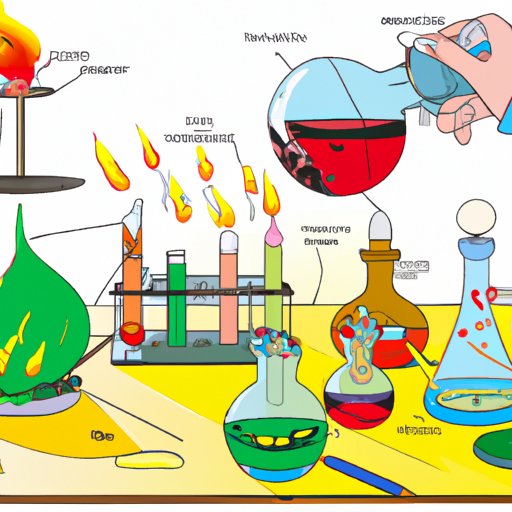
Introduction
When most people think of chemistry, they likely conjure up images of beakers, lab coats, and periodic tables. But there’s a branch of chemistry that goes beyond these surface-level associations, one that plays a critical role in our daily lives and fuels scientific exploration. This is the world of physical chemistry, a fascinating and complex field that few outside of it understand. In this article, we’ll delve into what physical chemistry is, explore its impact on everyday life, and take an in-depth look at the role of the physical chemist.
Exploring the World of Physical Chemistry: An Introduction to Physical Chemists
Physical chemistry is the branch of chemistry that deals with the study of matter and energy at a molecular and atomic level. Essentially, physical chemists focus on understanding how and why chemical reactions take place, through the exploration of fundamental concepts like thermodynamics, quantum mechanics, and statistical mechanics.
Within the realm of chemistry, physical chemistry is intimately related to other areas of study, such as organic and inorganic chemistry, materials science, and chemical engineering. It’s important to note that physical chemistry is about more than just experimentation – many physical chemists also focus on developing theories and models that explain the processes they study.
Physical chemistry has been studied since the late 19th century, when scientists began to recognize that chemical reactions were related to energy and thermodynamics. Since then, the field has expanded to encompass topics as varied as computational chemistry, biochemistry, and spectroscopy.
Physical chemists play a critical role in advancing our understanding of the natural world. By studying chemical reactions at a fundamental level, they provide valuable insights into how we can manipulate and control different systems.
Physical Chemistry: A Field That’s All Around Us
Physical chemistry might sound like an esoteric academic subject, but it’s actually a field that’s all around us. In fact, it touches nearly every aspect of daily life, from the makeup we wear to the cars we drive.
One example of physical chemistry in action is in the development of medications. Physical chemists help design new drug molecules that can effectively target specific areas of the body. They also work to understand how drugs interact with cells and molecules, which is essential in developing safe and effective treatments.
In another example, physical chemistry plays a key role in the production of consumer goods. Consider, for instance, the paint on the walls of your home. Physical chemists help develop new paint formulas that are durable, long-lasting, and environmentally friendly.
Breaking Down the Science of Physical Chemistry and Its Role in Modern Exploration
So, what exactly do physical chemists study? The answer is, quite a lot. They’re responsible for exploring fundamental concepts like thermodynamics, the properties of gases, and the behavior of matter at a molecular level.
Physical chemists also play a vital role in scientific exploration beyond our planet. For instance, NASA employs physical chemists to study the chemical reactions that occur in zero-gravity conditions. Understanding these reactions and developing new materials that can withstand them is essential to advancing space exploration.
In recent years, physical chemistry has also played an increasingly important role in developing renewable energy technologies. For example, physical chemists work on developing new battery materials that can store and release energy more efficiently, leading to more effective and sustainable power solutions.
What is a Physical Chemist and What Do They Do? An In-Depth Look
For those interested in pursuing a career in physical chemistry, there are certain skills and qualifications that are essential. Typically, a physical chemist will need at least a bachelor’s degree, with many also holding advanced degrees in the field. It’s also important to have a deep understanding of foundational concepts like thermodynamics, kinetics, and quantum mechanics.
Physical chemists can work in a variety of different roles, including academic research, industrial R&D, and government agencies. Those in academic research might focus on developing new theories or exploring fundamental concepts in the field. Those in industrial R&D might help develop new products or technologies that rely on physical chemistry concepts. And those working in government agencies might be responsible for ensuring compliance with regulations related to chemical processes and products.
Some specific examples of projects that physical chemists might work on include developing new materials for solar cells, designing more efficient chemical reactions for industrial processes, or exploring the fundamental properties of certain molecules or materials.
The Versatility of Physical Chemistry in Multiple Industries
Physical chemistry is a field that’s present in a myriad of industries and applications. In addition to the examples we’ve explored above, physical chemists also work in fields like environmental science (studying atmospheric chemistry, for instance), food science (developing new flavorings and preservatives), and even art conservation (studying the chemical properties of pigments and materials used in artwork).
And for those who don’t want to pursue a traditional physical chemistry career path, the skills and knowledge gained in the field can translate into a variety of other industries. For instance, someone with a background in physical chemistry might work in consulting, data science, or energy policy.
Conclusion
Physical chemistry is a fascinating and varied field that’s all around us. From the medication we take to the materials that make up our world, physical chemistry is essential for understanding the building blocks of the natural world and advancing scientific innovation. By exploring the role of physical chemists and the everyday impact of physical chemistry, we hope to encourage more people to take an interest in this dynamic and important field.





